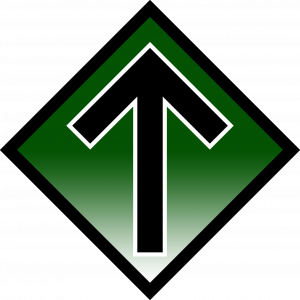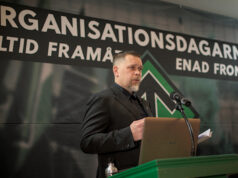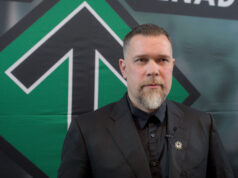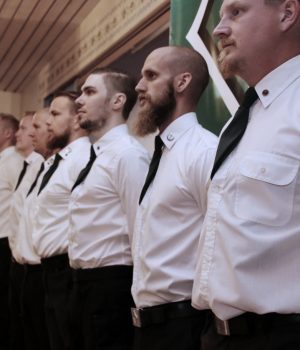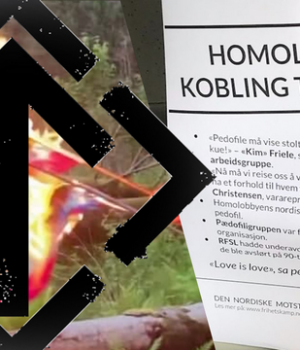OPINION. Arnar Styr Björnsson writes about the German national awakening beginning in the early 19th century.
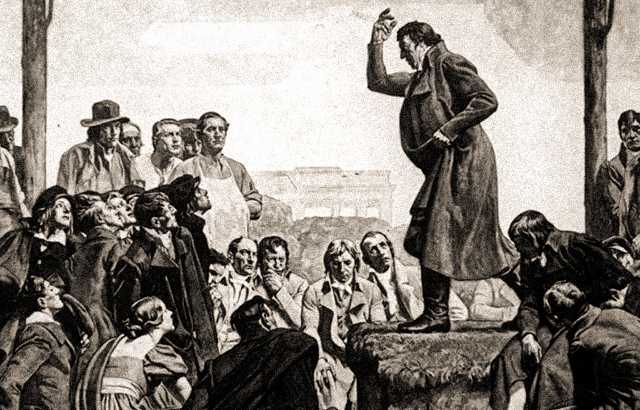
Part I
“But the most precious possession in this world is our own people and for this people and because of this people we will struggle and we will fight, never weaken and never tire and never hesitate and never despair.”
– Adolf Hitler
“I call heaven and earth to witness against you today, that I have set before you life and death, blessing and curse. Therefore choose life, that you and your offspring may live,”
– Deuteronomy 30:19
In this essay I want to bring to light a few ideas and thinkers to underscore the righteousness of our struggle against internationalism, multiculturalism and our dispossession. The current ethical ideas that dominate the universities, media and public discourse are wholly unfavourable to our cause, and our existence. But the latent sense of duty that awakens many of us, and calls us to resistance, is nothing but a divine voice of the eternal moral law that stipulates that life is to be chosen over death, and that behaviour, ideas and institutions, through which we ourselves came into existence and on which we depend, are to be defended at all costs. Our enemies are defending abstract ideals, which in practice ultimately mean nothing but death. We, however, are on the side on life, and it is we who love our people and are engaging in a selfless struggle for their preservation.
We begin with the German idealist reaction to the critical transcendental philosophy of Immanuel Kant. The German idealists did not only challenge Kant’s metaphysics and philosophy of mind, but also his moral philosophy, which he laid out in the monumental works Groundwork of the Metaphysics of Morals (1785) and the Critique of Practical Reason (1788). Kantian ethics are known as normative, or rule-based ethics. The concept of the categorical imperative forms the kernel of his ethical theory, and it can be described as “an objective, rationally necessary and unconditional principle that we must always follow despite any natural desires or inclinations we may have to the contrary.” Kant formulated it thus: “I ought never to act except in such a way that I could also will that my maxim should become a universal law.” The focus in Kant’s ethics is therefore not on the consequences or general outcome of one’s action, but whether the action itself is intrinsically right or wrong. Man is a rational being and is himself the author of the moral law he must conform to. Therefore, he must formulate a rational law for himself according to which he is willing to act only in such a way that it would be equally applicable to every rational will, that is all men. He must never treat others as a means but always as ends in themselves. However reasonable this may seem, it gives little guidance or direction to man’s life and destiny. It is not surprising then that Kantian ethics are employed to justify a social order whose highest ideals are equality, human rights, longevity and consumption. Kant of course, could not have foreseen how his ethical theory would be abused to justify modern liberalism.
However, German idealists, like Friedrich Hegel and Friedrich Schleiermacher, drew their ideas from the divine fountain of ancient Greek wisdom, rather than from the reigning spirit of the Enlightenment. The word ethics is derived from the Greek word ἔθος (ethos), which means not only moral conduct, but also custom or habit. Interestingly, ἔθος stems from the Indo-European word s(w)e- just like the Greek word ἔθνος (ethnos), which means nation or people, and is the root of ethnic. Similarly, the German word Sitte, means custom, while Sittlich means both customary and ethical.
Hegel’s starting point of his discussion of spirit in Phenomenology of Spirit (1807) is the concept of Sittlichkeit, which is translated as ethical order, and derived from that which is conventional. He thought that the historical conventions that structure social life made those who lived under them approachable to the investigator. The conventional practices represent an actualized, or concrete form of life, while the individuals have in turn internalized the general patterns of conduct in their acculturation. To be able to understand the psychological structure of the human self, it must be understood in relation to its experience and action regarding the outside world. Without such a dialectical analysis of the self, only a one-dimensional conception of the self emerges. Philosophy is thus necessarily historical, since the nature and development of the human mind can only be analyzed in relation to its historical and social existence. To understand ideas, one must first investigate their historical materializations in things like family, commerce, politics and religion. To become self-aware, man must know different types of human experience in history, how states were organized and the reigning spirit of each era.
In Hegel’s study of ancient Greece, we find that it is the state which is the foundation of morality and not some abstract notions of rights or duties deriving from simple conceptions of the mind. In fact, it is our relation to the state and to other people in our community which determines what our rights and duties are:
[…] to Plato, however, the reality of mind – that is of mind as opposed to nature – appeared in its highest truth as the organization of a state which, as such, is essentially moral; and he recognized that the moral nature (free will in its rationality) comes to its right, to its reality, only in an actual nation. […] Plato thus takes his start from that justice which implies that the just man exists only as a moral member of the state […]
We, who are accustomed to the sacredness of the so-called “marketplace of ideas” and the right to unhindered freedom of speech, and even to the freedom of international corporations and foreign entities to corrupt our commonly held customs and ideas for their depraved ends, may need some adjustment to the discomfort of following Hegel upward into a brighter world:
[…] the state really rests on thought, and its existence depends on the sentiments of men, for it is a spiritual and not a physical kingdom. Hence it has in so far maxims and principles which constitute its support, and if these are attacked, the government must intervene.
In our time, we are so steeped in the dogmas of individualism that it has become hard to take notice of how popular culture idealizes eccentrics and weirdos, even to the extent that antisocial behavior and outright depravity is promoted as being more admirable than living according to the norms of society. Those upheld as the heroes of our time are often those who reject norms and acceptable behavior. We are led to believe that because society, and its institutions, is oppressive, it must be changed to suit the individual, however he would like to live. The aggregate effects of this are seldom laid out; people are simply to be allowed to live as they please, with no further questions asked. This, Hegel would not tolerate:
[…] the first principle of the state is that there is no reason or conscience or righteousness or anything else, higher than what the state recognizes as such. Quakers, Anabaptists, &c., who resist any demands made on them by the state, such as to defend the Fatherland, cannot be tolerated in a true state. This miserable freedom of thinking and believing what men will, is not permitted, nor any such retreat behind personal consciousness of duty. If this consciousness is no mere hypocrisy, in order that what the individual does should be recognized as duty, it must be recognized as such by all.
Of course, one must sympathize with the healthier individualists today who want to go their own way, like homeschooling parents, gun hoarders, or people who try to be self-sufficient. These people are simply resisting the anarcho-tyranny of Western governments. They are trying to restore order in a world of chaos, however misguided some of them may be. They would surely feel at home in healthier societies. But most of the non-conformism today is of the destructive, leftist kind. Hegel’s point is that a pattern of behavior is basically immoral if it cannot become a norm for all, without destroying or seriously harming society and the body politic.
Friedrich Schleiermacher rejected the Enlightenment idea of history as progress toward increasing peace and perfection. He saw history as the unfolding of God’s will through struggle and sacrifice. God had shaped the ethos and spirit of the German nation, and only through obedience to this ethos and spirit could the Fatherland be realized. This obedience could demand the ultimate sacrifice of one’s own life. Schleiermacher was particularly amused by the silly idea of dying for the cause of individual liberty, because how could one enjoy liberty if one was already dead? No, it was worthy only to die for the Fatherland.
Schleiermacher’s dualistic philosophy saw the world as a representation of two forces at work that make up reality as we experience it, namely the ideal and the real. The ideal is the spiritual realm, and the real is the physical. The ideal principle is not equally at work everywhere, it has little effect in dead matter, and it increases through living beings, plants, then animals, and reaches its culmination in man. He thought of man as an organism of the ideal principle as it expressed itself in human institutions like family, nation, agriculture and the state. The idea of the good was for Schleiermacher the so-called “ethical process”, which is the progressive domination of nature by reason. Accordingly, the good is not equally found in all nations and races, and they differ in the extent to which they are under the domination of either reason or nature.
Unlike Enlightenment thought, Schleiermacher did not think of reason and the ethical duties in the abstract, but rather, he argued that reason was given to us only through our embodiment and natural constitution, and this was not accidental, but essential. The soul only comes into being in the body, which is brought into existence by one’s parents. Man is thus constituted by his family, nation and race. He is not an absolute moral agent, because his historical, social and biological setting define him. Further, man’s ethical existence is never isolated, but is an extension of the ethical wills of his parents, community and nation, without which he would not exist. The individual is already an ethically organized being at birth. He shares in the process that brought him into being and has a duty to partake himself in that process according to his nation’s destiny.
“Ethics, as the depiction of the way in which reason and nature coexist, is the science [of the principles of] history,” was his definition of ethics. It is a principle that permeates all life, and what advances life is what is ethical. The state constitutes such an advance as it expresses and sanctions the customs of the social organism in its laws, thus furthering its ends. Of the state, Schleiermacher wrote: “When such an institution is founded, it is one of the greatest steps forward possible for our race. […] It follows that patriotism is good, and those who think it is not for them are like guests or aliens.” But the idea that the state’s only purpose is to secure rights, whether of the Lockean, libertarian kind, or the human rights of modern leftism, would have been repugnant to Schleiermacher: “To transform the state into a mere legal institution, […] would be to reverse the direction of the ethical process.” The state must be active in the life of the nation and express its destiny.

